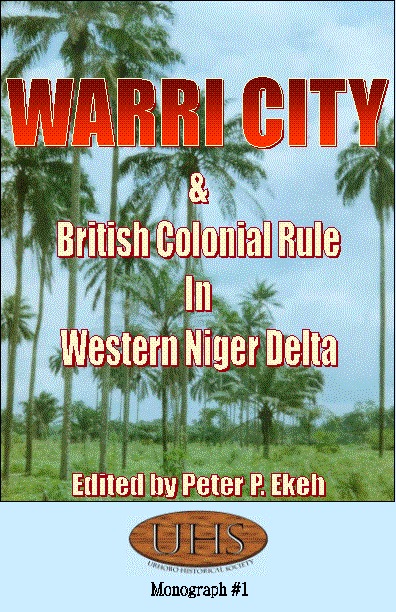| Urhobo Historical Society |
&
British
Colonial
Rule in
Edited
by
Professor
Peter Ekeh
Foreword
by
Senator
David Dafinone
Warri City
&
British
Colonial Rule in Western Niger Delta
is a documentation of European contacts with
Among the
consequences of
Portuguese commercial and political activities in the Western
Niger
Delta was
the social formation of Itsekiri ethnic nationality. Following
a
rupture in
Portuguese-Benin relations in the 1530s, the Portuguese
assisted the
two
surviving sons of the fugitive Benin Prince Ginuwa to
construct a new
ethnic
nationality named Itsekiri from among migrant Yoruba fishing
communities in the
Western Niger Delta. The Itsekiri later supplied middlemen in
the trade
between
Europeans and hinterland agricultural communities in the
international
trade
linking
Portuguese
dominance in the
Niger Delta waned with the campaign to abolish the slave trade
in the 19th
century and was replaced with British ascendancy in the
region. The
British
initially followed the path of Portuguese relations with the
Itsekiri
who were
then concentrated in the creeks of
The political
fortunes of the
Western Niger Delta were severely affected in the
decolonization decade
of the
1950s when Chief Obafemi Awolowo�s Action Group government
inherited
political
authority from British colonizers. This transfer of political
authority
favoured the Itsekiri establishment which then shed the
official name
of
Itsekiri, substituting Warri in its place. Among its claims on
this
account is
the assertion that all Warri labels, including
In Warri
City
&
British Colonial Rule in Western Niger, evidence is
presented to
demonstrate that the indigenous Agbassa were owners of the
lands of
Warri City
long before Itsekiri nationality was fashioned by Ginuwa�s
sons and the
Portuguese from the 1530s onwards. Several chapters of the
book further
demonstrate that the British fully recognized and acknowledged
from the
British-Itsekiri treaties of 1884 and 1894 that the Itsekiri
were a
coastal
people of the banks and lands of
�
Urhobo
Historical Society 2004
�������������������������������..
Book�s
Launching
at
the Fifth Annual Conference of Urhobo Historical Society
Venue:
Petroleum
Training Institute, Effurun
Date:
Time:
Chairman:
Chief
E. K. Clark
Reviewer:
Olorogun
Professor F.M.A. Ukoli
Chief Launcher: Olorogun Moses
Taiga
